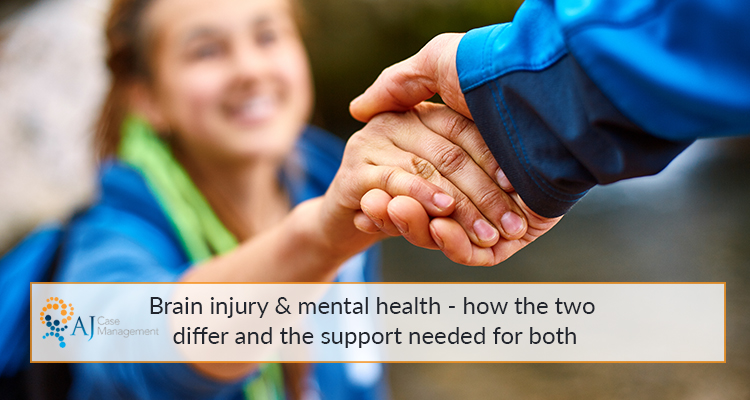
In this guide we will be discussing the similarities and differences between mental illness and brain injuries, and how the two can be related.
Find out how trauma to the brain could lead to a psychiatric disorder, the potential symptoms and the support available to manage them.
Setting goals is a vital part to reaching your milestones and focusing on the things that matter to you, so keep reading to find out how to set productive goals and why they are so beneficial.
Understanding the brain and mental illness
Our brains are responsible for everything we think, feel and do. It’s the central hub for all our physical and mental activity and controls every action we make, whether this be intentional or reflex.
It is an organ made of soft tissue which contains hundreds of billions of nerves. Although it is protected by a strong, resilient skull, it can still become damaged through various forms of injuries, internal or external.
Once the nerves or cells are damaged, this can cause physical, emotional, cognitive and behavioural issues.
But, how can the brain sustain an injury and what is classed as a ‘traumatic’ brain injury?
What is a brain injury?
Brain injury is a vaguer term that refers to any kind of trauma to the head which results in a type of injury to the brain. This can range from a minor to a major injury.
For example, this could range from a mild traumatic brain injury, such as a concussion, to a traumatic brain injury where certain motor or cognitive skills have been affected either in the short term or long term.
To read more about traumatic and non-traumatic brain injuries, the symptoms and how severity can be measured with the Glasgow Coma Scale, take a look at our brain injury page.
What is a mental illness?
A mental illness is a mental health condition that can affect mood, behaviour, thoughts and emotions.
Nearly one in five US adults experience some form of mental illness. It is a medical issue that can be caused by psychological, genetic, biological or environmental factors.
It is a treatable illness of the brain and there are many forms of therapy, counselling and rehabilitation, with new methods being developed every day.
Brain injuries and mental illness can be linked in some cases, with an injury leading to a potential mental health condition.
Source: www.psychiatry.org
Can brain trauma lead to psychiatric disorders? Getting the support you need…
The first thing to note when discussing the link between brain injuries and mental illness is that it is important to understand someone’s individual journey and that no two brain injuries are the same.
It can be easy to sometimes make assumptions, but brain injuries and mental illnesses are so varied and complex, it is always best to focus on the individual rather than applying blanket statements.
Mental health issues and brain injuries can be linked, or the two can be entirely separate conditions.
As to whether a brain injury can cause a mental health condition, it could be through the physical effects of the trauma.
Inflammation, damage to the cells or nerve damage are all examples of physical trauma that could lead to a psychiatric disorder.
Or, psychological effects could lead to this type of disorder through stress, emotional problems or not having the right tools/ support to deal with the rehabilitation of a brain injury.
With both causes, support is needed throughout rehabilitation and there are many ways to overcome the symptoms.
Keep reading to find out how the right support can be life changing and the ways in which symptoms can be managed.
Traumatic brain injury symptoms – how they can be managed so you can focus on what matters and look forward to the future…
For some, the symptoms that come with a brain injury or mental illness can be the biggest issue to deal with and manage in their lives.
There are many forms of therapy and rehabilitation routes that will help manage the symptoms, but how do you manage all of this and maintain a healthy and productive recovery?
Case management is a collaboration of services and support that includes the coordination of rehabilitation, care and clinical needs. A case manager will create the perfect plan for you that fits all these aspects of your rehabilitation into your daily life.
Once this care plan has been created, they will be there every step of the way to help you set goals, evaluate progress, improve and tailor the plan as you go through the process and make sure your emotional wellbeing is happy and healthy.
Here are some of the ways a case manager can help you overcome the symptoms of a brain injury oe mental illness:
Talking Therapy
This can include therapy such as counselling, cognitive behavioural therapy, behavioural action or mindfulness-based therapies.
It allows people to discuss their thoughts and feelings in a safe space. When discussing these issues, the therapist can give you the tools to address these negative thoughts and feelings or find an effective way of coping with them.
Speech Therapy
Speech therapy is a way to assess and treat problems with communication, speech or language. It can also be used for those who need support with eating, drinking or swallowing.
There are many methods a therapist can use to address a speech disorder or issue with communication for children and adults.
Occupational Therapy
Occupational therapy can be used for a wide range of conditions, including those who have difficulties due to a mental illness or physical disabilities due to a brain injury.
An occupational therapist will help you develop the skills to take part in everyday tasks that are important to you. They work with you to build the future you want and improve emotional wellbeing by providing the right support and care.
Methods of this therapy could include developing new ways to approach everyday tasks, recommendations for the best supporting technical equipment and improving the ability to live independently.
Neuropsychology
Neuropsychology centres around the understanding of how medical conditions linked with the brain affect the psychology, cognitive skills, behavioural skills and emotional wellbeing of a person.
It relates the brain psychology to its own structure, comparing the two and researching how they affect one another.
A neuropsychologist will recommend treatment and rehabilitation for brain injury related conditions or psychiatric disorders.
The importance of setting goals for your injury and mental wellbeing…
Whether you’re living with a mental illness, brain injury or both conditions, setting goals is a productive way to manage your rehabilitation and take control of your recovery.
A case manager will work with you to create suitable goals that will not only aid, but also give you direction in your recovery.
They are a constructive way to regularly analyse your recovery and discuss which parts of your rehabilitation are having a positive impact and which need improving on.
Here are things to think about when setting goals for rehabilitation:
- What do I want to improve? Examples of this could be your employability, physical health, relationships or management of mental health.
- Why do I want to achieve these goals? Especially in the early stages of rehabilitation, it is important to focus on goals that are going to improve your emotional wellbeing and physical health, rather than working on goals simply to please someone else.
- How am I going to achieve these goals? Setting unachievable goals can be counter-productive to recovery, so at first try setting goals that you know are achievable.
- How am I going to measure these goals? When setting goals, think about how you are going to measure the success of them. For example ‘Improve physical health’ is good, but a little vague. To measure this, you could set a goal as ‘Be able to walk into the local village without a walking aid’.
- How am I going to manage these goals? As important as it is to set goals, it is just as important to decide how you will manage them. Talking about them is the first step, but it is then a useful idea to write them down somewhere, perhaps a journal, so you can keep track of your progress.
Getting a diagnosis and the next steps to reaching your milestones…
If you suspect you or a loved one are suffering with a brain injury or mental illness, its important to reach out to and seek professional support.
Get in touch today to seek advice regarding a brain injury. For support with a mental illness, speak to your local GP or head to mind.org.uk for useful advice.

